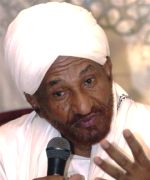Sudan rejects UN in Darfur as it seeks to win conflict – Mahdi
Feb 28, 2007 (CAIRO) — The Sudanese government is refusing to allow U.N. peacekeepers in Darfur because it knows the U.N. troops would help hunt down war crimes suspects for the International Criminal Court, a top Sudanese opposition leader says.
 Former prime minister Sadiq al-Mahdi said Khartoum was also hoping to resolve the conflict in Darfur on the military front by defeating the rebels.
Former prime minister Sadiq al-Mahdi said Khartoum was also hoping to resolve the conflict in Darfur on the military front by defeating the rebels.
The government’s rejection of the U.N. peace force is “irrational and very insensitive to the humanitarian problem in Darfur,” where 2.5 million people have become refugees and more than 200,000 have died in three years of fighting, al-Mahdi said in an interview with the Associated Press this week.
U.N. Secretary-General Ban Ki-moon is still waiting for Sudanese President Omar al-Bashir to reply to a Jan. 24 letter that put forward specific proposals for the deployment of 22,000 U.N. and African Union troops in Darfur, the vast western region of Sudan.
Al-Bashir has long rejected the deployment of U.N. troops as a “colonialist” attempt to subjugate Sudan.
Al-Mahdi dismissed that argument, saying Khartoum fears U.N. troops would help track down war crimes suspects sought by the International Criminal Court, based The Hague.
“The existence of U.N. troops will make it more possible to police (for) the ICC,” he said.
Prosecutors at the ICC on Tuesday named a former Sudanese junior interior minister, Ahmed Mohammed Harun, as a suspect in war crimes in Darfur, saying he paid and recruited janjaweed militias responsible for murders, rapes and torture. They also named a janjaweed militia leader, Ali Mohammed Ali Abd-al-Rahman.
Al-Bashir’s government is accused of unleashing the Arab janjaweed, blamed for widespread atrocities against ethnic African civilians in Darfur. Khartoum denies supporting the janjaweed, but al-Mahdi said the militias were “the irregular troops of the government.”
“Atrocities have been committed and those who committed them have got to be brought to book,” al-Mahdi said.
Al-Mahdi said the government was also rejecting the U.N. deployment because “they want to keep the military option open.”
Al-Mahdi, whose government was toppled in a 1989 military coup led by al-Bashir, is known to have influence in Darfur. He leads the main faction of the Umma Party, which traditionally wins the plurality of votes in elections in Sudan. In the 1986 polls — the last to be considered free and fair — Umma swept Darfur by a landslide.
He is also the great grandson of the Mahdi, the 19th century nationalist who ousted Egyptian colonial forces under the British general Charles Gordon. Darfur played a major role in that rebellion and many of its tribal elders today revere Sadiq because of his illustrious ancestor.
Interviewed in his apartment in the Cairo suburb of Nasr City on Sunday, al-Mahdi said his party supports Darfur war crimes trials before the ICC and the deployment of U.N. peacekeepers in Darfur.
For peace to come in Darfur, the Khartoum-appointed governors of the three states of Darfur — North, South and West — had to be replaced because they implemented the counter-insurgency policies that led to the atrocities, al-Mahdi said.
“People now believe the present governors have blood on their hands,” he said.
Earlier this month, al-Bashir warned that if the world were to deploy UN peacekeepers without Sudan’s consent, they would receive “the lesson we taught you” in the 19th century — a reference to the Mahdi’s victory.
Asked what he thought of al-Bashir exploiting his great grandfather, al-Mahdi replied it was a “gimmick.”
“There is no comparison between now and the 19th century,” he said. “The U.N. here is not contemplating conquering Sudan or conquering Darfur. It’s there to help us with containing certain humanitarian problems.”
(AP)
